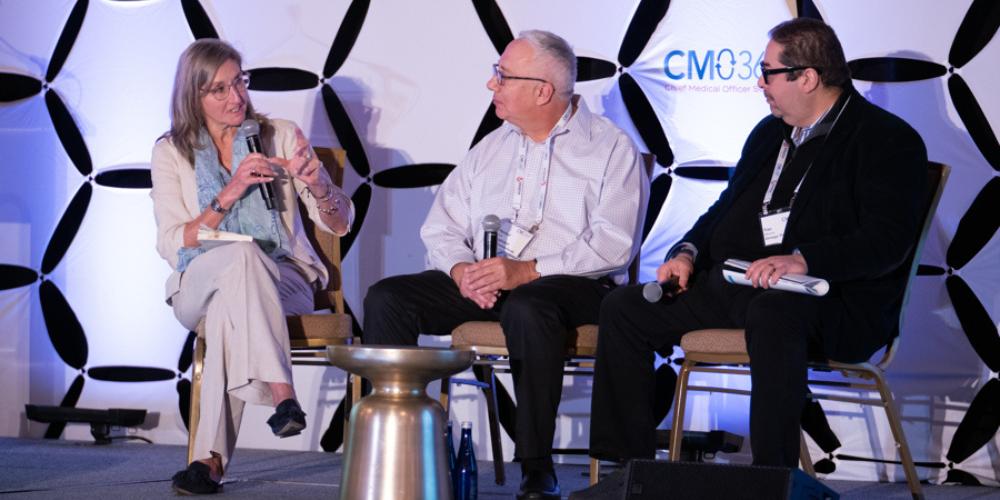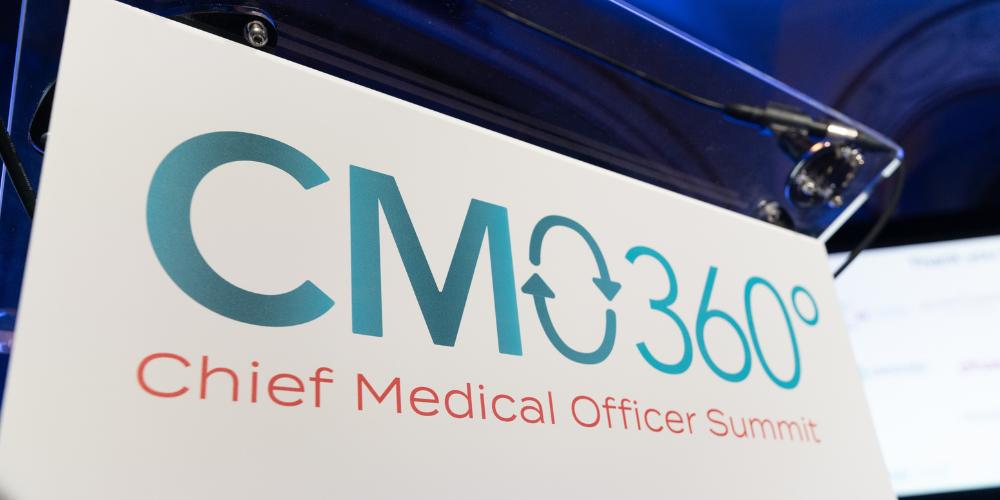Advice for Your CMO Career Development from a Veteran CMO
James “Terry” Ferguson, MD, former CMO of Matinas BioPharma, discusses advice for how to approach the transition from academia to industry, what to look for in prospective companies and how to tailor your career development to align with your values.

How do you know when you’re ready to become a CMO?
You’re never really “ready.” What happened for me was that after 20+ years in academia and 11+ years in industry an opportunity presented itself that built on virtually all aspects of my background, and I went for it. I wasn’t looking for a CMO role at the time, but somebody I had worked with in the past was kind enough to suggest to the CEO at Matinas that I might be a good fit for what they were looking for.
Yes, a leap of faith into the unknown, but an eyes-wide-open leap with a lot of experience under my belt. I knew I didn’t have any actual experience as a CMO, but I understood the expectations of the CEO and the Board, knew that I had the skills and experience to meet those expectations, and was willing to grow into whatever additional role responsibilities might present themselves over time. In retrospect it would have been great to move into a CMO role earlier, but the opportunity never presented itself; the Catch-22 is that people are almost always looking for people with prior CMO experience. If an opportunity arises, it can be totally worth the leap – you have to start somewhere.
There are many different skills people are looking for in a CMO, and you are never going to have all of them coming into your first CMO position, or even in subsequent ones. To make that leap, you have to have a clear picture of what is expected, a realistic idea of what you can do and the will to add to that skill set over time. In many small companies, you aren’t just the CMO, you’re the “OMO” or the Only Medical Officer, and there are lots of opportunities to grow and expand your skill armamentarium
How was the transition from academia to industry?
It was a huge adjustment from the solitary-high-level-predator world of academia to the fractally-complex matrix of industry. I don’t care how highly placed you are and how much you know, you should not be coming straight out of academia into a CMO role – there is just too much to learn – and that adjustment will take years. The nuances of making the initial leap from academia to industry would occupy volumes. I would venture to say that most CMOs have spent at least some time in academia, but the real trick on both moving from academia to industry and stepping into that first CMO role is landing at the right place at the right time with the right people.
As physicians, we are steeped in a command-and-control environment; we make the decisions and write all the orders. In the world of industry, there are multiple perspectives that impact corporate decisions, and medical is just one of them. In industry you become one voice at the table, and need to understand where you sit in a much more complicated ecosystem. You need to understand why commercial is doing this and regulatory is doing that. We become influencers, and not necessarily decision makers. Our job is to make sure the right decisions get made.
"As physicians, we are steeped in a command-and-control environment; we make the decisions and write all the orders. In the world of industry, there are multiple perspectives that impact corporate decisions, and medical is just one of them."
How do you make sure that you're jumping into the right spot?
Understanding what you are getting into really matters. Understanding what you are going to be asked to do once you get there also really matters.
Part of the problem (and one of the biggest drivers of disappointment) is that what you think you “understand” does not always align with the on-the-ground reality. You can do all the diligence you want (and you should do plenty), but you never totally understand what is really going on until you are actually there. It is certainly true for that first foray from academia to industry, but it is even more true when you move into your first CMO role.
What about from a culture perspective?
The two most important things for me when looking at companies are science and culture, although “culture” can be a very hard thing to pin down. I’ve come to appreciate that culture is usually something that trickles down from the top, and a very quick way to biopsy corporate “culture” is to look closely at the leadership team you are potentially joining. Do they know what they are doing? Are they dependable? Honest? Motivated? Supportive? Trustworthy?
One of the things that had a real impact for me was that my interview for Matinas was a board meeting, where I was not expected to sit quietly on the sidelines. It was a chance for each of us to pressure test the other and see what it’s really like to play at the level of CMO with the CEO, board and entire leadership team. It was amazing – a peek under the hood while the engine was running – with an eye to not just what was being said but also how and why it was being said.
Central to success in a CMO role is the CEO, because the CMO-CEO relationship is the foundation underlying the whole enterprise. That person, and your relationship with them, matters most of all.
"Central to success in a CMO role is the CEO, because the CMO-CEO relationship is the foundation underlying the whole enterprise."
What else do you consider?
I never looked at financials as hard as I probably should have. You need to understand the financial underpinnings of the company: where things are going, what the runway looks like and what needs to happen to remain on a solid financial footing.
One other important consideration is that as a first-time CMO, you are not going to have the sort of internal mentors that are so important in moving to industry – you are it. That’s where external mentors – colleagues and contacts who can give you advice and guidance – become so important for first-time CMOs.
Many of us coming from academics think we know all the answers to everything. We don’t. And, more often than not, there is not one right answer to a problem, just a list of alternatives; with experience you have more options to consider, but until you get a sufficient foundation of experience, it makes sense to take advantage of the experience and perspectives of a mentor.
How do you find a good mentor?
Reach out to people – don’t be shy. Be honest with yourself when you find yourself out of your depth. Talk to former colleagues, friends and contacts from meetings like CMO360. There is a whole CMO community out there who knows how challenging the role can be, and who are more than happy to share their perspectives.
You are new to the role and can’t be expected to know everything. Don’t try to pretend that you do. It takes time to develop sufficient self-awareness to realize what you don’t know and additional skills and experience you may need for the future.
"You need to understand the financial underpinnings of the company: where things are going, what the runway looks like and what needs to happen to remain on a solid financial footing."
What are some of the other major considerations when looking at potential companies?
You need a clear understanding about what “good” looks like for what you’re going to be asked to do and what peoples’ expectations are for you coming into the role – the CEO, the Board, other members of the leadership team.
For me, at Matinas, what they were really looking for was a “storyteller,” someone who could help pull together, in collaboration with external thought leaders, the physiology, the pathology, the therapy and where their particular potential product might fit in to the cardiometabolic world, assembled into a cohesive, consistent, credible narrative. Moreover, that narrative isn’t static. It has to continue to expand and evolve as more internal and external data emerge. That happened to align very well with my skill set, and although the outward facing audience was more in the way of analysts and investors rather than practicing physicians, a cohesive narrative was still every bit as important. Of course, things did change a lot over time, but with a firm foundation and having established internal and external credibility, it was possible to pivot effectively as things changed.
Are there any specific red flags to be conscious of when joining a company?
Getting back to culture, a very large red flag would be a culture heavily populated with people who think they know everything, are unwilling to even listen to well-intended outside perspectives, and, worse yet, people who won’t admit when they don’t know something because asking for help is viewed as sign of weakness or failure. Rigid adherence to swim lanes may be part-and-parcel of the Big Pharma world, but in the water-polo-world of biotech it’s a sure-fire strategy for failure
Expanding on that, a failure-phobic culture is not going to work in biotech. As we used to say in Texas, “Good judgement comes from experience, and a lot of experience comes from bad judgement.” Making mistakes means you are learning faster. If there is constant “blamestorming” and everyone is pointing fingers and unwilling to accept responsibility for things that may not have gone the way they wanted, that’s another red flag. If you are not failing occasionally, you are not pushing hard enough. If you only bet on sure things, your incremental advancement is way too slow for today’s biotech world.
Having that level of insight into the culture of a company is not easily acquired from the outside – in ideal circumstances having people you know and whose judgement you respect already in place will get you a much clearer picture of what that corporate culture is really like.
"Good judgement comes from experience, and a lot of experience comes from bad judgement."
What have been some of the biggest challenges for you?
As physicians, we are often required to make critical decisions in the absence of complete background information. We do the best we can with the data you have at hand at the time a decision needs to be made. As a CMO, you are called upon to do the same sorts of things as you balance priorities within the organization in a resource-constrained world. You are also often presented with circumstances or decisions where there may not actually be a “right” answer or a winning strategy – there are just a number of not-so-good options, and you have to choose the least risky pathway. I really don’t like working in damage-control mode, but that’s just how it shakes out sometimes.
Another challenge we all face is managing people, particularly as you move into periods of growth. With top performers, it’s the best job in the world. When performance is not going well, it can be the worst job in the world as you try and get things back on track. One of the toughest things for me is deciding when things have moved beyond the point of no return. At what point do you let an underperforming person go? As a medical doctor, there is always more you can do for someone who is sick. In business, it’s a little more complicated. In general, in these situations, my two guiding principles are first, are they listening to advice and not just trying to improve, but actually improving? And second, have things gotten to the point where other people are going to continue to need to step in to make sure this work gets done. Not an easy call sometimes, but one that has to be made.
Any other challenges?
There are plenty of things in life – and business - that you can’t control. No plan survives contact with the enemy and even with the best plans in place there are plenty of times where things just do not go to plan. Things happen that aren’t anybody’s fault and that nobody could have predicted. The latter is something that I personally struggle with, because as a physician you are trained to anticipate, to try to prepare for all the bad things that can go wrong. Sometimes you have to stop kicking yourself for things that nobody could have anticipated.
I talked a little earlier about failure – that failing just means you are learning faster. Another challenge is the discipline to actually learn from your failure, to not just brush them off, but to look hard – and objectively – for root causes for failure and having to courage to take responsibility for doing things better next time.
How can CMOs be more strategic about their career development?
Ultimately, as your career progresses, you have to continually ask yourself hard questions about what it is that you want to do. As a CMO, there are many different kinds of opportunities out there. Fundamentally, is what you are doing and where you are doing it ego-syntonic or ego-dystonic? Deep down inside not everyone really wants to stay on the hamster-wheel as a big important person with a whole bunch of people reporting to them and tons of responsibility. You need to align and adjust your own personal career, not just to bigger and bigger jobs with bigger and bigger companies for bigger and bigger paychecks. You need to take the time to think about what gets you up in the morning – what you enjoy – and target your personal career development to do exactly that. You can always learn more. You can always do things better. But you need to strategically grow your repertoire of skills and your breadth of experience based on directions that you enjoy. More is not necessarily better, and you will always do better at things that you want to do than things you just have to do.
It’s also helpful to take a step back every once in a while, and explore the driving forces behind your own personal evolution – the proverbial “its-the-journey-not-the-destination” approach, but looking at the “why” behind the decisions and changes in direction along the way. For me, in retrospect, it's pretty straightforward: Wherever I go I want to add value, I want to be valued and I want to continue to learn and grow and evolve. Having fun is important. And it is nice to be able to have at least some tangible impact within an organization.
Understanding that has helped a lot as I look to my own future.
In This Article








